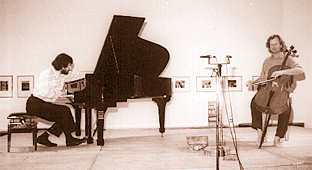Bürck - Graeter Duo
Bürck - Graeter-Casserley Trio

Roland Graeter, cello/voice
Lawrence Casserley, live electronics
In the autumn 1995 Rainer Bürck, composer and pianist specializing in contemporary repertoire, and Roland Graeter, specializing in improvised music, decided to form a duo, trying to build bridges from their different backgrounds between contemporary "composed" and improvised music. When Rainer Bürck met composer Lawrence Casserley in the summer of 1996 the idea was born to transform the duo into a trio with Casserley processing the sounds of the piano, cello and voice with the help of his IRCAM signal-processing work-station. Rehearsals aimed less at the creation of particular musical material than at the process of reacting to, and communicating with each other, aiming to let the unexpected and unpredictable happen and trying to avoid cliches.